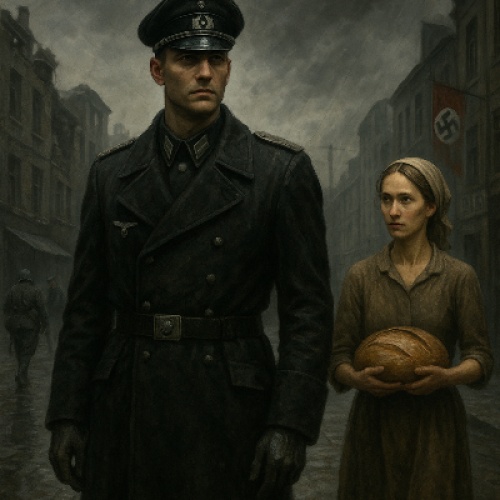Anna wiped her hands on her flour-dusted apron and with effort moved the heavy loaf onto the wooden table.
Her fingers were cracked, scarred, and despite the small wounds, they kneaded dough again and again with unwavering persistence.
The bakery smelled sweetly.
Heavily.
Like something that recalled childhood, safety... a world long gone.
Outside the small display window, footsteps shuffled - quick, timid, sometimes rough and heavy, accompanied by the harsh voice of a German soldier.
Anna did not look.
She had learned to look away.
To see was to draw attention.
And in these days, attention was as dangerous as a knife.
Just a little longer, she thought, wiping sweat from her forehead with the back of her hand. Just one more morning, a few more loaves, just one more day...
Every day was the same.
Every day was a struggle for survival - not grand and heroic, but silent, invisible, everyday.
The bell above the door creaked.
Anna flinched.
She looked up and saw the first customer - an old woman in a faded coat, her hands clenched into fists.
Without a word, Anna handed her a loaf wrapped in a ragged cloth. The woman nodded, silently placed a few coins on the counter, and disappeared into the mist.
Anna watched her figure dissolve into the gray morning, and her throat tightened.
How much longer?
How much longer could a world survive where people no longer greeted each other, no longer smiled, where fear stood between every word?
The bell rang again.
But this time, it was not the quick, cautious jingle of an ordinary person.
It was a hard, confident clanging - followed by sharp, firm steps.
Anna swallowed dryly.
Without needing to look, she knew it was them.
Black boots, polished to a shine, broke through the filth on the bakery's threshold.
Anna felt her body tense automatically, her shoulders sinking lower to make herself smaller, less visible.
But none of it mattered.
They knew where she was. They saw her.
A man stood in the doorway.
Tall, broad-shouldered, with a coat belted tight with leather, a black cap pulled low over his forehead.
His eyes were cold, expressionless - the eyes of a man used to commanding, not expecting resistance.
Hans.
Anna didn't know his name.
Not yet.
But the moment their eyes met, his name was burned into her memory even before it was spoken.
Without greeting, he crossed the bakery, spreading street filth across the tiles.
He stopped in front of the counter.
He brushed his glove over his coat, as if trying to rid himself of invisible dust - or perhaps of his own dirt.
Anna lowered her gaze.
Her heart pounded in her ears.
Not because she expected a blow or an order.
But because, in that silence, anything was possible.
"Bread," he said simply.
His voice was deep, unwavering.
The voice of someone used to having his wishes fulfilled.
Anna, wordlessly, reached for a loaf.
Her fingers, still dusted with flour, slipped across the rough crust while only one thought hammered in her mind:
Don't look up. Don't look.
She placed the bread on the counter.
Coins clinked - hard and cold, like stones thrown into a well.
Hans did not leave.
Instead, he stood there.
Staring at her with that hard, assessing gaze, as if weighing whether to say more.
And then, without warning, he spoke softly:
"Tomorrow you will bring two crates to the square.
No one must see you."
It was not a question. Not a request.
It was an order.
Anna inhaled, as if wanting to object - but the words stuck in her throat.
There was no room for discussion in his stance.
She nodded.
Hans nodded back - a slight, almost imperceptible dip of his head -
and turned sharply, his coat swirling like a shadow.
The bell above the door rang again.
This time, like a blow.
And Anna stood there, alone, her hands buried in flour, feeling as if she had just stepped from the warmth of the oven into an icy prison.
The door slammed shut, and the silence in the bakery was suddenly deafening.
Anna stood, staring at the empty spot where he had just been.
Her fingers clutched her apron in a death grip.
Her chest rose and fell rapidly, as if she had been running instead of standing still.
What have I done?
What have I agreed to?
Her gaze slid to the hardened coins on the counter - they lay there like a stigma, a silent reminder of her helplessness.
Money.
For silence. For obedience.
She closed her eyes and took a deep breath.
The scent of bread, which usually filled the room with warmth and comfort, now seemed heavy and suffocating.
Sour.
I shouldn't have nodded.
But what else could I have done?
Since the first day of the occupation, she had known:
the choice between right and survival no longer existed.
Only the choice of being crushed - quickly or slowly.
Anna rubbed her forehead where a headache was brewing.
In the corner of the bakery, the oven hissed, its quiet crackling like a distant storm.
She reached for another batch of dough.
She had to work.
She had to do something - or else something inside her would break.
Meanwhile, people were gathering on the square - whispering, avoiding each other's eyes, hurrying by with heads bowed low.
Anna knew that everything she did, everything she said or left unsaid, could become a weapon in the hands of those who wore black coats.
And now, one of them had chosen her.
She didn't yet know how much it would change her life.
But she felt it.
In her bones.
In her blood.
The oven crackled louder, and Anna bit her lip in her mind.
Survive, she thought. Just survive today.
The square was silent.
Far too silent.
Anna felt as if every breath she took could be heard miles away.
On her back, she carried two crates of flour, as she had been ordered.
They were heavy, awkward, their wooden edges digging painful grooves into her hips with each step.
No one must see me, she repeated Hans's words in her mind, drumming like raindrops against a window ledge.
But it was impossible.
In a town where shadows mingled with real people, everything was seen.
Anna made her way down a side alley, where only empty window frames - like blind eyes - looked out.
She felt sweat running down her spine, her heart hammering in her throat.
She was only a few steps from the old warehouse where she was to deliver the flour when she heard what she feared most.
Footsteps.
Sharp, rhythmic.
And with them, deep voices. German. Short commands.
Anna clutched the crate tightly, her heart leaping into her throat.
She turned the corner as quickly as she could and pressed herself against the wall.
Her hair clung to her forehead, her hands cramping around the wood.
As they passed, she kept her eyes shut.
Don't see me. Please.
Silence.
The footsteps faded away.
Anna slowly opened her eyes and held her breath.
Standing at the other end of the alley was Hans.
His hands clasped behind his back, his head tilted slightly.
He wasn't watching her like a man who happened to run into an acquaintance.
He was watching her like someone who controlled her every move.
Without moving, he nodded toward the warehouse door.
An order.
Anna obediently nodded, lowered her head, and with all her strength dragged the two crates to the door.
Hans passed her without a word.
His coat brushed against her side.
He said nothing.
He didn't have to.
When he disappeared into the shadow, Anna sank to the ground beside the crate and pressed her forehead against the rough wall.
She was gripped by cold and fear.
But somewhere deep inside - somewhere she could not yet admit even to herself - something else was beginning to stir.
Anger.
And perhaps... perhaps something even more dangerous.
Back at the bakery, the air was heavy.
Anna closed the door and leaned against it.
Her body trembled, though it was cold outside.
She slid down the door onto the floor.
She didn't even have the strength to change out of her soaked coat.
She sat there, breathing quickly, shallowly, trying to convince herself she was safe.
But she knew she wasn't.
What does he want from me?
Why me?
She buried her face in her hands and, for the first time in a long while, allowed herself to feel despair.
The flour in the air burned her eyes; the dryness in her throat choked her.
And yet, when she closed her eyes, it wasn't the floor she saw.
It was his gaze.
Cold. Direct.
Not the look of a man toward a woman - but the look of a man toward something he could take.
And yet there was something even worse in that gaze.
Something Anna didn't want to dissect.
Something that made her tremble not only with fear - but with something deeper, rawer, that flushed her cheeks with heat.
Anger.
Shame.
And something she dared not name.
Anna stood up, grabbed the first loaf of bread, and began working without thinking.
Her fingers kneaded the dough, shaped it, placed fresh loaves onto the stone.
Automatic motion.
No thoughts.
Because if she allowed herself to think, if she let herself fall into her own fear, she would have to admit that her world was no longer as solid as she had believed.
That a single look, a single word, a single gesture from Hans had shaken her to her core.
Outside, it began to rain.
Rain trickled down the windows in thin ribbons, drops drumming on the ledge like a warning.
And Anna knew: something had changed today.
Irreversibly.
Forever.
The next morning, the town was even quieter than usual.
The rain had not stopped.
Water streamed along the cobblestones, forming little rivers in the cracks, and the smell of damp earth and cold stone hung in the streets.
Anna stood behind the counter, flour on her sleeves and damp strands of hair clinging to her forehead.
The loaves lay ready - but no customers came.
Only the oppressive silence.
The bell above the door jingled - and Anna knew instantly that it wasn't one of the ordinary folk.
That sound.
That urgent, relentless jingle.
It could only be him.
Her heart skipped a beat.
Hans stood in the doorway.
Again in a black coat, his cap pulled low over his eyes.
He crossed the room without a word.
His heavy boots left dirty, wet tracks on the floor, a clear sign that he ruled this space.
He stopped at the counter and watched her for a while without saying anything.
Anna kept her hands hidden under the counter to hide their trembling.
"Tonight," he finally said quietly, though his voice carried the sharp edge of a knife.
"You will bring loaves to the administration building."
Anna blinked.
It was not a question.
It was not a suggestion.
It was an order.
She swallowed hard and nodded.
Hans took a step closer.
He was so near now that she could feel the dampness of his coat, the smell of leather and rain.
He leaned toward her.
"Don't try anything," he whispered.
"I know everything about you."
His breath brushed her face.
Cold.
Relentless.
Anna bowed her head even lower.
Her pride burned like an open wound.
But she stayed silent.
She had to.
Hans watched her a moment longer, then - without another word - picked up one of the loaves from the counter.
Without paying.
He walked out as if taking what was rightfully his.
The bell above the door didn't jingle this time.
It gasped.
Anna remained standing there, leaning against the counter, struggling to breathe past the pain tightening around her chest.
You will never have peace again, she thought.
Not while he is here.







